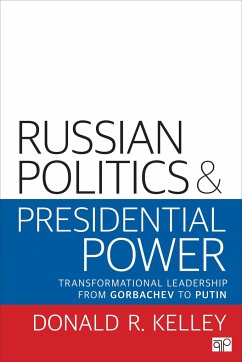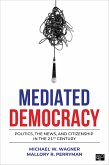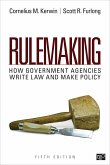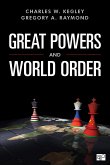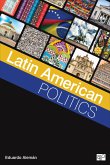Donald R. Kelley
Russian Politics and Presidential Power
Transformational Leadership from Gorbachev to Putin
Donald R. Kelley
Russian Politics and Presidential Power
Transformational Leadership from Gorbachev to Putin
- Broschiertes Buch
- Merkliste
- Auf die Merkliste
- Bewerten Bewerten
- Teilen
- Produkt teilen
- Produkterinnerung
- Produkterinnerung
This is an in-depth look at the Russian presidency as a case study of institution-building in a setting in which a strong executive faces the dual tasks of creating political, economic and social stability while simultaneously institutionalizing democratic rule.
Andere Kunden interessierten sich auch für
![An Ibm(r) Spss(r) Companion to Political Analysis An Ibm(r) Spss(r) Companion to Political Analysis]() Philip H. PollockAn Ibm(r) Spss(r) Companion to Political Analysis83,99 €
Philip H. PollockAn Ibm(r) Spss(r) Companion to Political Analysis83,99 €![Mediated Democracy Mediated Democracy]() Michael W. W. Wagner (USA University of Wisconsin - Madison)Mediated Democracy125,99 €
Michael W. W. Wagner (USA University of Wisconsin - Madison)Mediated Democracy125,99 €![Rulemaking Rulemaking]() Cornelius Martin KerwinRulemaking100,99 €
Cornelius Martin KerwinRulemaking100,99 €![The European Union in the 21st Century The European Union in the 21st Century]() Nikolaos Zahariadis (USA Rhodes College)The European Union in the 21st Century115,99 €
Nikolaos Zahariadis (USA Rhodes College)The European Union in the 21st Century115,99 €![Great Powers and World Order Great Powers and World Order]() Charles W. Kegley (USA University of South Carolina)Great Powers and World Order83,99 €
Charles W. Kegley (USA University of South Carolina)Great Powers and World Order83,99 €![American Difference American Difference]() Lori M. Poloni-StaudingerAmerican Difference90,99 €
Lori M. Poloni-StaudingerAmerican Difference90,99 €![Latin American Politics Latin American Politics]() Eduardo AlemanLatin American Politics125,99 €
Eduardo AlemanLatin American Politics125,99 €-
-
-
This is an in-depth look at the Russian presidency as a case study of institution-building in a setting in which a strong executive faces the dual tasks of creating political, economic and social stability while simultaneously institutionalizing democratic rule.
Hinweis: Dieser Artikel kann nur an eine deutsche Lieferadresse ausgeliefert werden.
Hinweis: Dieser Artikel kann nur an eine deutsche Lieferadresse ausgeliefert werden.
Produktdetails
- Produktdetails
- Verlag: SAGE Publications Inc
- Seitenzahl: 312
- Erscheinungstermin: 25. Oktober 2016
- Englisch
- Abmessung: 226mm x 152mm x 13mm
- Gewicht: 378g
- ISBN-13: 9780872894044
- ISBN-10: 0872894045
- Artikelnr.: 36360704
- Herstellerkennzeichnung
- Libri GmbH
- Europaallee 1
- 36244 Bad Hersfeld
- gpsr@libri.de
- Verlag: SAGE Publications Inc
- Seitenzahl: 312
- Erscheinungstermin: 25. Oktober 2016
- Englisch
- Abmessung: 226mm x 152mm x 13mm
- Gewicht: 378g
- ISBN-13: 9780872894044
- ISBN-10: 0872894045
- Artikelnr.: 36360704
- Herstellerkennzeichnung
- Libri GmbH
- Europaallee 1
- 36244 Bad Hersfeld
- gpsr@libri.de
Preface
Acknowledgments
About the Author
Chapter 1: Executive Power in Russian Politics
What Does Executive Leadership Mean in the Russian Context?
Authoritarian Modernizers: The Prototype
Characteristics of Authoritarian Modernizers
What Can We Learn from Past "Executives"?
Earlier Authoritarian Modernizers
The Brezhnev Era: The Long Calm before the Storm
The Uncertain Interregnum: Andropov and Chernenko
Chapter 2: The Gorbachev Presidency
The Starting Point: What Gorbachev Intended
Gorbachev's Rise to Power
From General Secretary to President
The Reform Agenda: Politics and Policy
Glasnost
The Economy: Perestroika
Judicial Reform
Foreign Policy
Political Reform: Democratization
Democratization of the Communist Party
The Gorbachev Presidency
The Presidency of the Russian Federation
The Battle of the Presidents
Gorbachev as an Authoritarian Modernizer
Chapter 3: The Yeltsin Presidency, 1991-1993
Yeltsin's Path to Moscow
From Outcast to President
The President Becomes a President
A Real President Gets a Real Nation
Personal Rivalries
Economic Reforms as a Political Issue
Yeltsin's Economic Reforms: Phase I (1991-1993)
The Reform of the Party-State
National Identity and the Union Treaty
Judicial Reform
The President and the Legislature
Foreign Policy
Yeltsin as an Authoritarian Modernizer: A Preliminary Assessment
Chapter 4: Yeltsin and Russia Reborn
The Presidency and the Legislature
Judicial Reform
The 1993 Duma Elections
The 1995 Duma Elections
The 1996 Presidential Election
The Second Term: From Victory to Resignation
Yeltsin's Economic Reforms: Phase II (1994-1999)
Foreign Policy
The First Chechen War
The December 1999 Duma Elections
Yeltsin's Surprise Resignation
Yeltsin as an Authoritarian Modernizer: A Final Assessment
Chapter 5: Putin I, 2000-2008
The 2000 Presidential Election
Vladimir Putin: From Spy Novels to the Kremlin
The Putin Formula
The Putin Presidency Emerges from Yeltsin's Shadow
Outside the Garden Ring: "Managing" the New Democracy
The Presidency and the Legislature: The 2003 Duma Elections
Judicial Reform
The 2004 Presidential Election
The Rules and the Game Change
The Run-Up to the 2008 Presidential Election
The 2007 Duma Elections
Putin's Economic Reforms
Foreign Policy
The Second Chechen War
The 2008 Presidential Election
Putin as an Authoritarian Modernizer
Chapter 6: The "Tandem"
Dmitry Medvedev: Putin's Friend from Leningrad
Governing the Nation in Tandem
Medvedev and Putin in Tandem
Factional Realities
Medvedev and Economic Reform
Medvedev and Political Modernization
Judicial Reform
Foreign Policy
The Russian-Georgian War
Medvedev and the Legislature: The 2011 Duma Elections
The Duma Election and Voting Fraud
The 2012 Presidential Election
Election Results
Medvedev as an Authoritarian Modernizer
Chapter 7: Putin II, 2012-
The "New" Cabinet
Putin II: Old and New Realities
Maintaining the Balance within the Garden Ring
Controlling the Opposition
The Economy: Prosperity and Modernity
Foreign Policy
Crimea and Ukraine
Russian Foreign Policy and the World
The Three Arenas of Russian Politics
Inside the Garden Ring: Factional Politics in Putin II
A Note on the Siloviki
Outside the Garden Ring: Politics in the Rest of the Russian Federation
The Authoritarian Modernizer Revisited
The Legal System and the Courts
Connecting Those Inside and Outside the Garden Ring
Political Parties
Civil Society
Control of the Media
The Leadership Cult as a Connection
Putin as an Authoritarian Modernizer
Chapter 8: The Future(s) of Russian Politics
The Future of the Russian Presidency(ies)
What Will Drive Change?
Changes in the Nature of Factional Politics
Changes in the Nature of Electoral Politics at the National, Regional, and
Local Levels
Politics Moves to the Street: A Color Revolution or Moscow Spring
What Is a Color Revolution?
A Russian Color Revolution?
Index
Acknowledgments
About the Author
Chapter 1: Executive Power in Russian Politics
What Does Executive Leadership Mean in the Russian Context?
Authoritarian Modernizers: The Prototype
Characteristics of Authoritarian Modernizers
What Can We Learn from Past "Executives"?
Earlier Authoritarian Modernizers
The Brezhnev Era: The Long Calm before the Storm
The Uncertain Interregnum: Andropov and Chernenko
Chapter 2: The Gorbachev Presidency
The Starting Point: What Gorbachev Intended
Gorbachev's Rise to Power
From General Secretary to President
The Reform Agenda: Politics and Policy
Glasnost
The Economy: Perestroika
Judicial Reform
Foreign Policy
Political Reform: Democratization
Democratization of the Communist Party
The Gorbachev Presidency
The Presidency of the Russian Federation
The Battle of the Presidents
Gorbachev as an Authoritarian Modernizer
Chapter 3: The Yeltsin Presidency, 1991-1993
Yeltsin's Path to Moscow
From Outcast to President
The President Becomes a President
A Real President Gets a Real Nation
Personal Rivalries
Economic Reforms as a Political Issue
Yeltsin's Economic Reforms: Phase I (1991-1993)
The Reform of the Party-State
National Identity and the Union Treaty
Judicial Reform
The President and the Legislature
Foreign Policy
Yeltsin as an Authoritarian Modernizer: A Preliminary Assessment
Chapter 4: Yeltsin and Russia Reborn
The Presidency and the Legislature
Judicial Reform
The 1993 Duma Elections
The 1995 Duma Elections
The 1996 Presidential Election
The Second Term: From Victory to Resignation
Yeltsin's Economic Reforms: Phase II (1994-1999)
Foreign Policy
The First Chechen War
The December 1999 Duma Elections
Yeltsin's Surprise Resignation
Yeltsin as an Authoritarian Modernizer: A Final Assessment
Chapter 5: Putin I, 2000-2008
The 2000 Presidential Election
Vladimir Putin: From Spy Novels to the Kremlin
The Putin Formula
The Putin Presidency Emerges from Yeltsin's Shadow
Outside the Garden Ring: "Managing" the New Democracy
The Presidency and the Legislature: The 2003 Duma Elections
Judicial Reform
The 2004 Presidential Election
The Rules and the Game Change
The Run-Up to the 2008 Presidential Election
The 2007 Duma Elections
Putin's Economic Reforms
Foreign Policy
The Second Chechen War
The 2008 Presidential Election
Putin as an Authoritarian Modernizer
Chapter 6: The "Tandem"
Dmitry Medvedev: Putin's Friend from Leningrad
Governing the Nation in Tandem
Medvedev and Putin in Tandem
Factional Realities
Medvedev and Economic Reform
Medvedev and Political Modernization
Judicial Reform
Foreign Policy
The Russian-Georgian War
Medvedev and the Legislature: The 2011 Duma Elections
The Duma Election and Voting Fraud
The 2012 Presidential Election
Election Results
Medvedev as an Authoritarian Modernizer
Chapter 7: Putin II, 2012-
The "New" Cabinet
Putin II: Old and New Realities
Maintaining the Balance within the Garden Ring
Controlling the Opposition
The Economy: Prosperity and Modernity
Foreign Policy
Crimea and Ukraine
Russian Foreign Policy and the World
The Three Arenas of Russian Politics
Inside the Garden Ring: Factional Politics in Putin II
A Note on the Siloviki
Outside the Garden Ring: Politics in the Rest of the Russian Federation
The Authoritarian Modernizer Revisited
The Legal System and the Courts
Connecting Those Inside and Outside the Garden Ring
Political Parties
Civil Society
Control of the Media
The Leadership Cult as a Connection
Putin as an Authoritarian Modernizer
Chapter 8: The Future(s) of Russian Politics
The Future of the Russian Presidency(ies)
What Will Drive Change?
Changes in the Nature of Factional Politics
Changes in the Nature of Electoral Politics at the National, Regional, and
Local Levels
Politics Moves to the Street: A Color Revolution or Moscow Spring
What Is a Color Revolution?
A Russian Color Revolution?
Index
Preface
Acknowledgments
About the Author
Chapter 1: Executive Power in Russian Politics
What Does Executive Leadership Mean in the Russian Context?
Authoritarian Modernizers: The Prototype
Characteristics of Authoritarian Modernizers
What Can We Learn from Past "Executives"?
Earlier Authoritarian Modernizers
The Brezhnev Era: The Long Calm before the Storm
The Uncertain Interregnum: Andropov and Chernenko
Chapter 2: The Gorbachev Presidency
The Starting Point: What Gorbachev Intended
Gorbachev's Rise to Power
From General Secretary to President
The Reform Agenda: Politics and Policy
Glasnost
The Economy: Perestroika
Judicial Reform
Foreign Policy
Political Reform: Democratization
Democratization of the Communist Party
The Gorbachev Presidency
The Presidency of the Russian Federation
The Battle of the Presidents
Gorbachev as an Authoritarian Modernizer
Chapter 3: The Yeltsin Presidency, 1991-1993
Yeltsin's Path to Moscow
From Outcast to President
The President Becomes a President
A Real President Gets a Real Nation
Personal Rivalries
Economic Reforms as a Political Issue
Yeltsin's Economic Reforms: Phase I (1991-1993)
The Reform of the Party-State
National Identity and the Union Treaty
Judicial Reform
The President and the Legislature
Foreign Policy
Yeltsin as an Authoritarian Modernizer: A Preliminary Assessment
Chapter 4: Yeltsin and Russia Reborn
The Presidency and the Legislature
Judicial Reform
The 1993 Duma Elections
The 1995 Duma Elections
The 1996 Presidential Election
The Second Term: From Victory to Resignation
Yeltsin's Economic Reforms: Phase II (1994-1999)
Foreign Policy
The First Chechen War
The December 1999 Duma Elections
Yeltsin's Surprise Resignation
Yeltsin as an Authoritarian Modernizer: A Final Assessment
Chapter 5: Putin I, 2000-2008
The 2000 Presidential Election
Vladimir Putin: From Spy Novels to the Kremlin
The Putin Formula
The Putin Presidency Emerges from Yeltsin's Shadow
Outside the Garden Ring: "Managing" the New Democracy
The Presidency and the Legislature: The 2003 Duma Elections
Judicial Reform
The 2004 Presidential Election
The Rules and the Game Change
The Run-Up to the 2008 Presidential Election
The 2007 Duma Elections
Putin's Economic Reforms
Foreign Policy
The Second Chechen War
The 2008 Presidential Election
Putin as an Authoritarian Modernizer
Chapter 6: The "Tandem"
Dmitry Medvedev: Putin's Friend from Leningrad
Governing the Nation in Tandem
Medvedev and Putin in Tandem
Factional Realities
Medvedev and Economic Reform
Medvedev and Political Modernization
Judicial Reform
Foreign Policy
The Russian-Georgian War
Medvedev and the Legislature: The 2011 Duma Elections
The Duma Election and Voting Fraud
The 2012 Presidential Election
Election Results
Medvedev as an Authoritarian Modernizer
Chapter 7: Putin II, 2012-
The "New" Cabinet
Putin II: Old and New Realities
Maintaining the Balance within the Garden Ring
Controlling the Opposition
The Economy: Prosperity and Modernity
Foreign Policy
Crimea and Ukraine
Russian Foreign Policy and the World
The Three Arenas of Russian Politics
Inside the Garden Ring: Factional Politics in Putin II
A Note on the Siloviki
Outside the Garden Ring: Politics in the Rest of the Russian Federation
The Authoritarian Modernizer Revisited
The Legal System and the Courts
Connecting Those Inside and Outside the Garden Ring
Political Parties
Civil Society
Control of the Media
The Leadership Cult as a Connection
Putin as an Authoritarian Modernizer
Chapter 8: The Future(s) of Russian Politics
The Future of the Russian Presidency(ies)
What Will Drive Change?
Changes in the Nature of Factional Politics
Changes in the Nature of Electoral Politics at the National, Regional, and
Local Levels
Politics Moves to the Street: A Color Revolution or Moscow Spring
What Is a Color Revolution?
A Russian Color Revolution?
Index
Acknowledgments
About the Author
Chapter 1: Executive Power in Russian Politics
What Does Executive Leadership Mean in the Russian Context?
Authoritarian Modernizers: The Prototype
Characteristics of Authoritarian Modernizers
What Can We Learn from Past "Executives"?
Earlier Authoritarian Modernizers
The Brezhnev Era: The Long Calm before the Storm
The Uncertain Interregnum: Andropov and Chernenko
Chapter 2: The Gorbachev Presidency
The Starting Point: What Gorbachev Intended
Gorbachev's Rise to Power
From General Secretary to President
The Reform Agenda: Politics and Policy
Glasnost
The Economy: Perestroika
Judicial Reform
Foreign Policy
Political Reform: Democratization
Democratization of the Communist Party
The Gorbachev Presidency
The Presidency of the Russian Federation
The Battle of the Presidents
Gorbachev as an Authoritarian Modernizer
Chapter 3: The Yeltsin Presidency, 1991-1993
Yeltsin's Path to Moscow
From Outcast to President
The President Becomes a President
A Real President Gets a Real Nation
Personal Rivalries
Economic Reforms as a Political Issue
Yeltsin's Economic Reforms: Phase I (1991-1993)
The Reform of the Party-State
National Identity and the Union Treaty
Judicial Reform
The President and the Legislature
Foreign Policy
Yeltsin as an Authoritarian Modernizer: A Preliminary Assessment
Chapter 4: Yeltsin and Russia Reborn
The Presidency and the Legislature
Judicial Reform
The 1993 Duma Elections
The 1995 Duma Elections
The 1996 Presidential Election
The Second Term: From Victory to Resignation
Yeltsin's Economic Reforms: Phase II (1994-1999)
Foreign Policy
The First Chechen War
The December 1999 Duma Elections
Yeltsin's Surprise Resignation
Yeltsin as an Authoritarian Modernizer: A Final Assessment
Chapter 5: Putin I, 2000-2008
The 2000 Presidential Election
Vladimir Putin: From Spy Novels to the Kremlin
The Putin Formula
The Putin Presidency Emerges from Yeltsin's Shadow
Outside the Garden Ring: "Managing" the New Democracy
The Presidency and the Legislature: The 2003 Duma Elections
Judicial Reform
The 2004 Presidential Election
The Rules and the Game Change
The Run-Up to the 2008 Presidential Election
The 2007 Duma Elections
Putin's Economic Reforms
Foreign Policy
The Second Chechen War
The 2008 Presidential Election
Putin as an Authoritarian Modernizer
Chapter 6: The "Tandem"
Dmitry Medvedev: Putin's Friend from Leningrad
Governing the Nation in Tandem
Medvedev and Putin in Tandem
Factional Realities
Medvedev and Economic Reform
Medvedev and Political Modernization
Judicial Reform
Foreign Policy
The Russian-Georgian War
Medvedev and the Legislature: The 2011 Duma Elections
The Duma Election and Voting Fraud
The 2012 Presidential Election
Election Results
Medvedev as an Authoritarian Modernizer
Chapter 7: Putin II, 2012-
The "New" Cabinet
Putin II: Old and New Realities
Maintaining the Balance within the Garden Ring
Controlling the Opposition
The Economy: Prosperity and Modernity
Foreign Policy
Crimea and Ukraine
Russian Foreign Policy and the World
The Three Arenas of Russian Politics
Inside the Garden Ring: Factional Politics in Putin II
A Note on the Siloviki
Outside the Garden Ring: Politics in the Rest of the Russian Federation
The Authoritarian Modernizer Revisited
The Legal System and the Courts
Connecting Those Inside and Outside the Garden Ring
Political Parties
Civil Society
Control of the Media
The Leadership Cult as a Connection
Putin as an Authoritarian Modernizer
Chapter 8: The Future(s) of Russian Politics
The Future of the Russian Presidency(ies)
What Will Drive Change?
Changes in the Nature of Factional Politics
Changes in the Nature of Electoral Politics at the National, Regional, and
Local Levels
Politics Moves to the Street: A Color Revolution or Moscow Spring
What Is a Color Revolution?
A Russian Color Revolution?
Index

